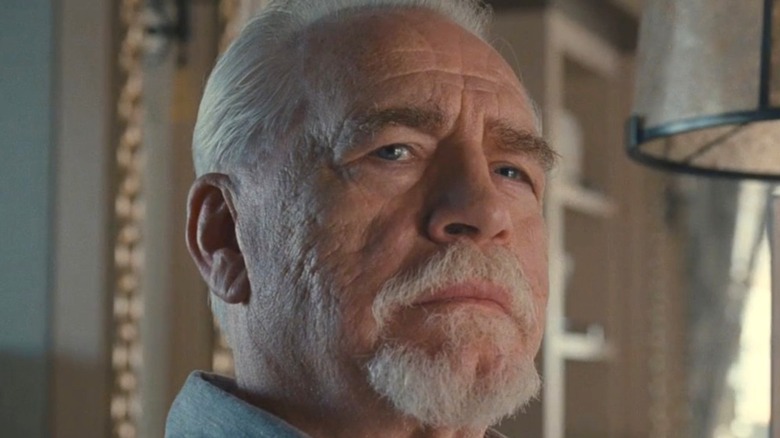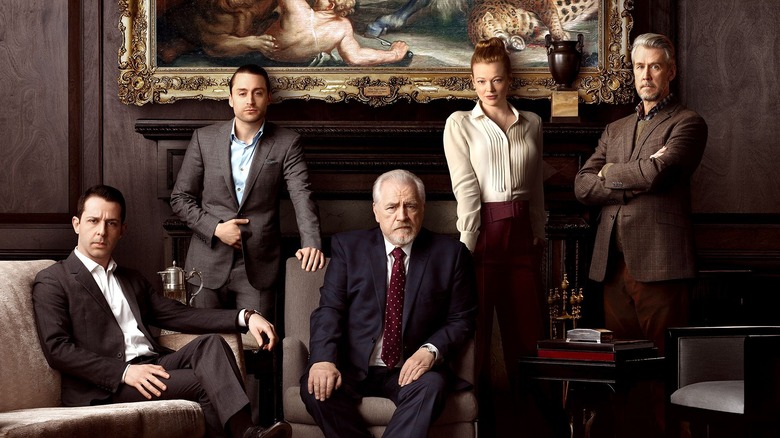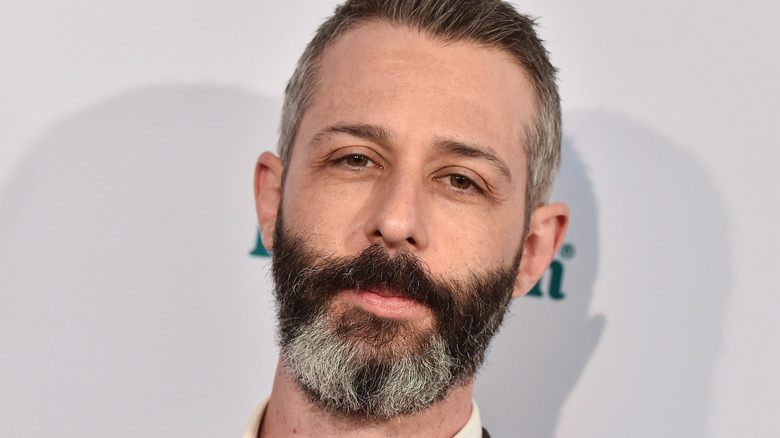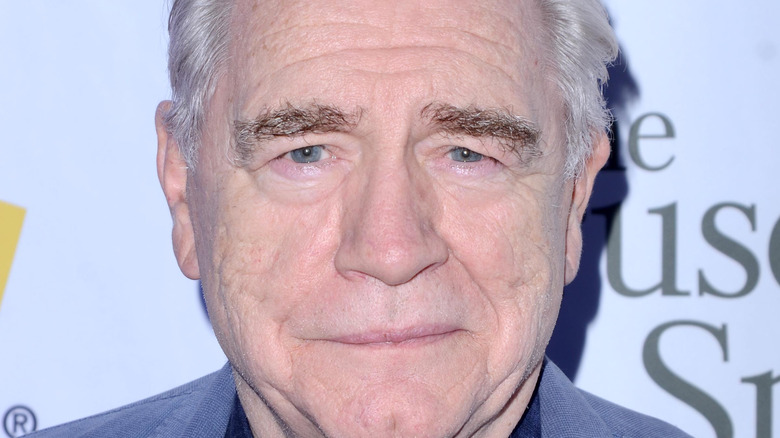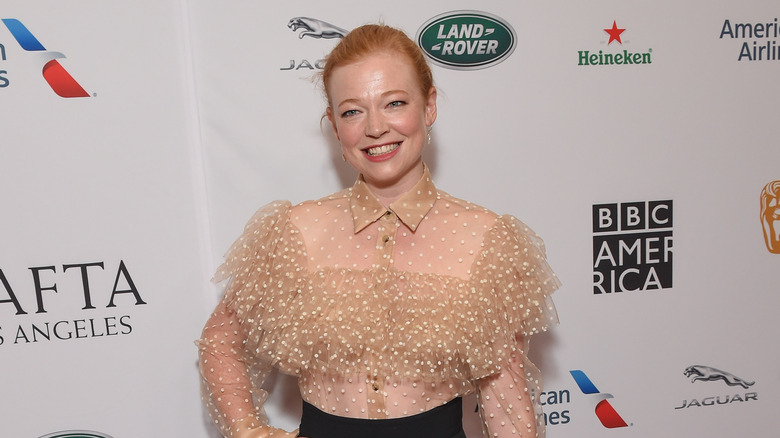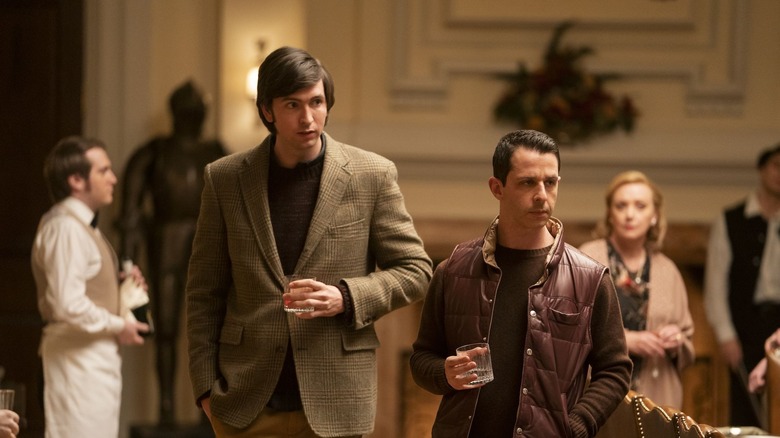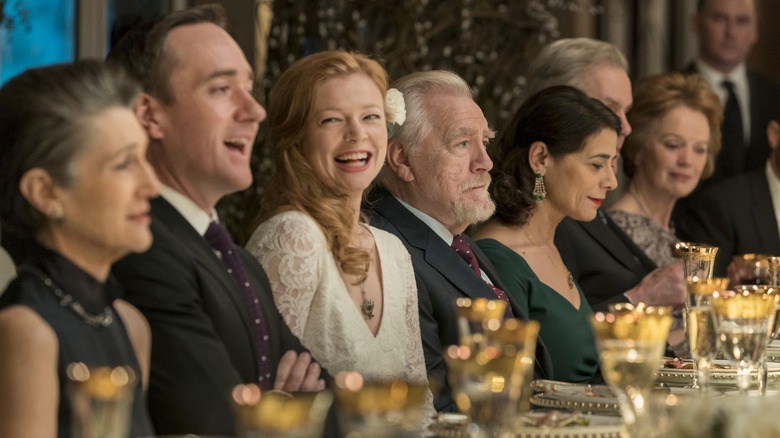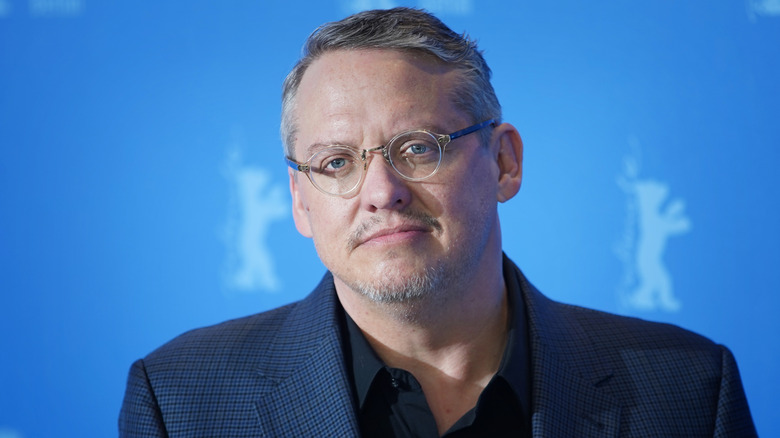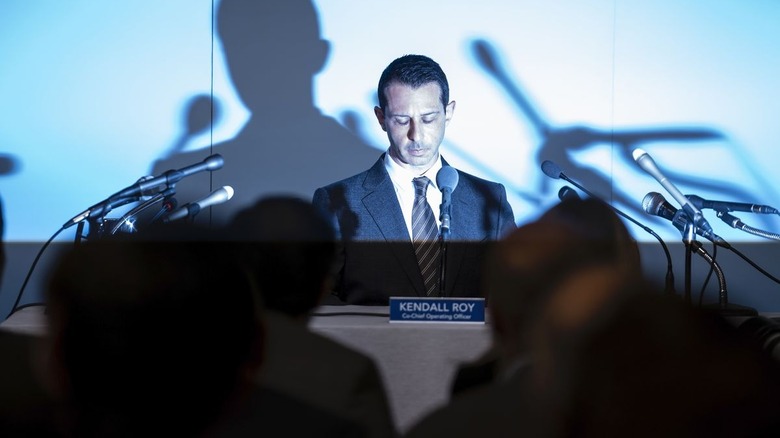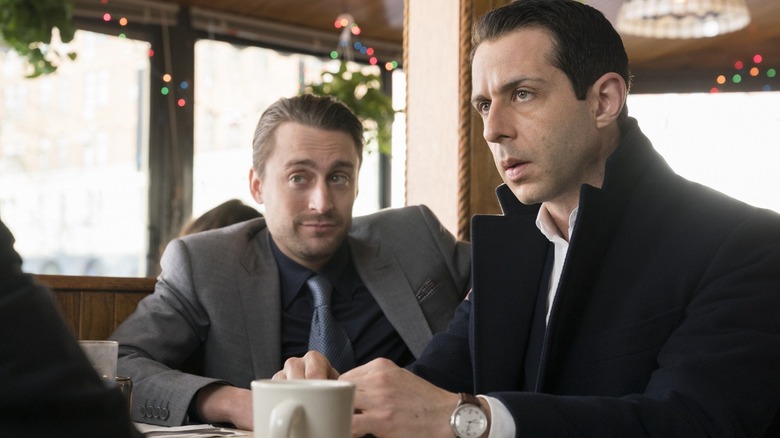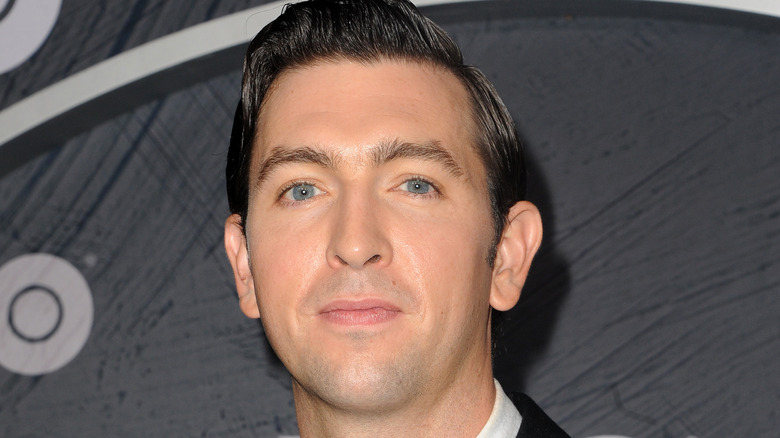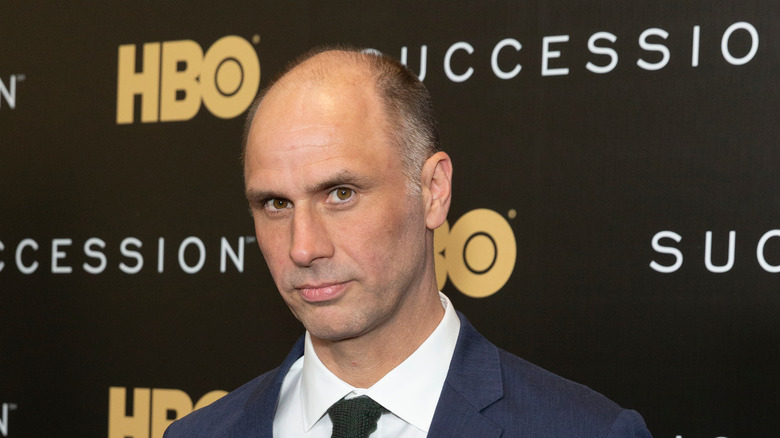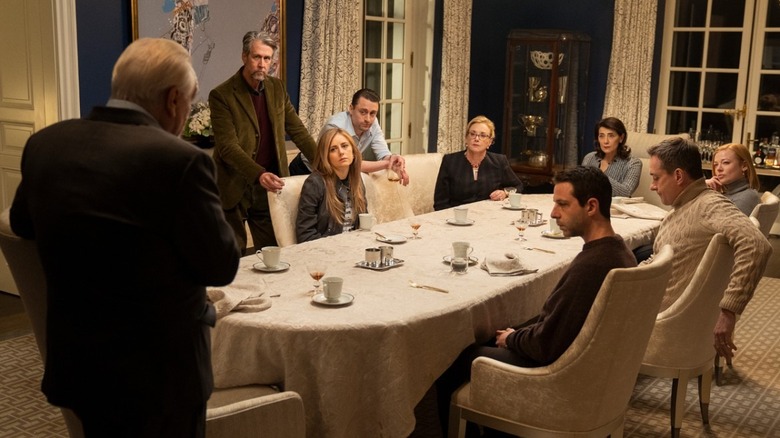The Untold Truth Of Succession
If you told people that an HBO show with a lot of dragons became a huge hit, it wouldn't be super surprising. Ditto an HBO comedy starring "Seinfeld" alum Larry David. A far more unlikely success story for this premium network has been "Succession," a show which started with no massive movie stars in its cast and centered its focus squarely on the duplicitous exploits of an ultra-wealthy New York family. It didn't quite sound like the kind of concept that would spawn a viewership juggernaut, let alone inspire a sizeable, loyal fanbase. But that's just what "Succession" has done over two seasons thanks to a barrage of awards season victories, whip-smart storytelling, and a gaggle of characters so unabashedly loathsome that viewers can't help but eat them up.
Even with all of the attention focused on "Succession" as it heads into Season 3, there are still plenty of details about the HBO program that remain unknown to even the most loyal fans of the show. Background elements related to everything from how Jeremy Strong connects with his "Succession" role to the program's journey in terms of viewership to lead performer Sarah Snook's initial misgivings about the show all reflect just how dense "Succession" is a piece of art. Like its central characters, every aspect of "Succession" has more going on than it appears on the surface.
Succession was supposed to be a movie
Though "Succession" has become one of the most acclaimed modern TV shows, this story wasn't always meant to be told on the small screen. Originally, series creator Jesse Armstrong had ambitions to tell this saga on a theatrical canvas.
While doing a profile on "Succession," The Hollywood Reporter noted that the show's origins dated back to a film script penned by Armstrong called "Murdoch." "I'd written a screenplay about Rupert Murdoch's family and it never got made," Armstrong explained to Radio Times. "And it got me interested in the similarities between all these guys — Murdoch, Robert Maxwell and Conrad Black — who are passing from their position of predominance as tech takes over. But, also, how cable news and newspapers are still shaping our political climate."
Though the screenplay never got turned into a finished film, it did help Armstrong secure notable gigs in the world of American television. However, real-world events convinced Armstrong that the sociopolitical subject matters he was so interested in needed to be urgently addressed through art. With this importance solidified, he would proceed to retool "Murdoch" as a TV show entitled "Immediate Family," though now the entity focused on an entirely fictional family. That initial wordy title would eventually get drastically altered, but the basic concept behind this program, as well as core themes from "Murdoch," would inform the show the world knows today as "Succession."
How Jeremy Strong relates to Kendall Roy
Kendall Roy is not an easy role for any actor to take on. The character is deeply unlikeable, yet the tragedy intertwined into this guy means the audience can't help but feel something for him. The complicated nature of the role makes it a challenge to take on, but performer Jeremy Strong has embraced the part, in the process garnering acclaim and even some impressive awards season victories.
As for what Strong likes best about the part, it turns out he can relate to Kendall Roy, at least somewhat. "I've always been a bit of an outsider with a fire in my belly," Strong explained to Variety. "I had a great desire to be an actor and a lot of ambition towards that. Ambition is a complicated thing, and Kendall is very ambitious. I relate to the desire to gain the love and respect of certain people, and that can lead you astray from your own nature. ... While this show is not based on any actual family, those dynastic struggles are all around. It's rich material." Finding those relatable details ensured that Strong could tackle a daunting but fascinating character like Kendall Roy.
Brian Cox sees Succession as timely yet timeless
It can be downright impossible to pinpoint the single reason a piece of art, including a TV show like "Succession," becomes as popular as it does. But one of the performers on this HBO program has a theory about why exactly "Succession" has taken off. For Brian Cox, the integral ingredient here is how the program straddles the line between being relevant to the present-day world while delivering drama that would be compelling in any era.
"What I was influenced by in the screenplay was 'King Lear.' There's a very classical element of dysfunctional royals. It's gone on through history," Cox explained to Variety about the appeal of "Succession," before stating that the show also has "a premise for now, about the entitled rich and what they are doing, it's a satire and a morality tale about people who are highly dysfunctional, and about how entitlement removes people from a sense of reality."
For Cox, the relevant elements of "Succession" are made all the more potent by the show's comedic details. "If you write something true about the world, it should include some comedy," he continued. "Otherwise, you take these people at their own estimation of themselves, which is more glamorous and capable than they are." When you combine that tricky tone with the timeless and the timely, you get something like "Succession," a show that would be deemed captivating no matter when it aired.
Sarah Snook had her doubts about Succession
Sarah Snook's "Succession" character, Shiv Roy, has ended up becoming one of the most fascinating figures on the show in how she reflects the complicated position women can occupy in major corporations. Does she want to obtain more power in her father's company that has such a poor view of women, or does she want to rebel against it? The conflict between power and establishing her autonomy makes for fascinating drama that Snook plays well. Despite all the rich material she's delivered over the first two seasons, though, Snook initially found herself hesitant to join "Succession."
"But when I first heard about it, I had some doubts," Snook explained to IndieWire. "I didn't know what character she was likely to become. She could just become the kind of handbag, pretty face, sort of trotting around as the female member of the family. And because of that, she goes to the sidelines, which women really face in this world. In reality there's still inequality in gender and gender pay gap and getting into business at that level. Clearly we see that within the show. And that wasn't something I was really interested in, if that was the case." Luckily, not only did Snook stick around on the show, but she was able to make sure Shiv was much more than a "handbag" in the Roy family drama.
Succession didn't have monster ratings initially
Despite having cultivated a sizeable fanbase, "Succession" did not appear to be a major success right out of the gate in terms of viewership. For its first season, "Succession" was a rookie show lacking household names either in front of or behind the camera. The tricky tone and seemingly aloof subject matter also presented a hurdle for getting the general public onboard to experience the unbelievable debauchery that the Roy family commits on a regular basis.
In reporting on its second season, Observer noted that the first season of "Succession" drew "modest ratings," with the series apparently failing to crack HBO's 15 most-watched programs of 2018. While not incredible in terms of viewership, "Succession" was still far from a dud in the ratings. Plus, increasingly positive reviews from critics and audiences as its first season went on ensured that it would be around on HBO for a while. Not all hit shows come blazing out of the gate with record-breaking viewership, and "Succession" is proof positive of just that.
Sarah Snook loves doing scenes with Matthew Macfadyen
Matthew Macfadyen first left a major impression on moviegoers with his various turns as a romantic lead in projects like "Pride & Prejudice." But with "Succession," Macfadyen has taken on a kind of role portraying Shiv's weaselly husband Tom. It's a part that's delightfully repulsive and allows Macfadyen to enjoyably rip apart his typical screen persona. Viewers aren't the only ones who enjoy Macfadyen's performance, as Sarah Snook, who shares many scenes with him, also likes working with the actor.
"Matthew is like one of my favorite, favorite humans," Snook said to IndieWire. "He's such a lovely, lovely man. And he's just so good at his job. So generous, so kind, so gentlemanly, so upstanding. And Tom is so different from that in so many ways. Not everyone's capable of playing that, which is the kind of actor he is. It's amazing. We do together have a lot of fun doing our scenes, and I find them easy because you get to watch and listen to him and then it kind of all happens. And then we have some of the most outrageous things to say, which is really fun to play." While the duo's scenes can sometimes leave viewers squirming with discomfort in their seats, it's clear from Snook's comments that much of that impactful quality is due to Macfadyen's totally unexpected but exceptional turn as Tom.
Director Adam McKay encouraged improv when filming the pilot
How do you make the Roy family, a bunch of ultra-wealthy people with personalities the size of the skyscrapers they own, feel like real people? It was a challenge that director Adam McKay, who helmed the pilot of "Succession," was tasked with cracking. A key way McKay decided to imbue a sense of realism into the first conversations viewers would see the Roy family members engage in was the simply process of improvisation.
"I always get a little itchy when everything is lining up too nicely. I wanna make sure there are some mistakes floating around," McKay explained to The Hollywood Reporter. "So I always throw improv in there to make sure that there's some collisions and accidents, and it was funny with this cast because usually, when I cast people, I [make sure they're] okay with improv ... but in this case, we had some classically trained actors who just looked me straight in the eyes and told me, 'There's no way that I'm improvising.'" However, McKay eventually coerced the cast of "Succession" to engage in some improvisation, resulting in the authentic tics and imperfections in the pilot that made the Roy family seem much more human.
The ending of Season 2 is meant to be ambiguous
The ending of Season 2 of "Succession" was one for the ages, as Kendall Roy betrayed his father, Logan Roy (Brian Cox), whose only response to this devastating development was a stern facial expression as he watched his son deliver that fateful press conference. It was a finale that generated plenty of conversation, including just what Logan Roy's expression meant. Was he angered at his son? Maybe even a touch proud seeing Kendall Roy finally take charge of his destiny?
That was just one of many details in this episode that left fans buzzing with questions. However, series creator Jesse Armstrong refuses to offer up easy answers to those queries. Talking to The Hollywood Reporter right after the season two finale, Armstrong said, "I kind of feel like it's nice to be able to have your own take on that stuff," when it came to ambiguous moments. However, one thing Armstrong did clarify is whether or not Logan Roy's final expression was scripted or improvised. "That's in the script," Armstrong explained. "But I think Brian performs it even more brilliantly than anything I could have suggested. But that was something he aimed for."
Succession's impressive viewership for Season 2
Though "Succession" didn't burn down the barn with its ratings in its first season, the show's second season was a whole different ballgame. Buoyed by people catching up on the first season in the meantime, not to mention the buzz from scoring several major nominations at the 71st Primetime Emmy Awards, "Succession" would not be the ratings underdog for its second batch of new episodes.
Right out of the gate, Season 2 was drumming up affectionate headlines about its viewership improvements, with The Hollywood Reporter claiming that "Succession" had hit a series high with the season's premiere episode in terms of how many were tuning in. Such exceptional success wasn't limited to just the inaugural episode, either. In reporting on viewership figures for Season 2's finale, The Wrap noted that "Succession" had hit a series high in terms of digital viewing with this episode. Additionally, the show had improved noticeably over Season 1 in terms of live viewership for the entire second season.
"Succession" had gone from being a modest ratings performer to something that was becoming a topic of watercooler conversation. It remains to be seen if Season 3 will keep up this impressive ratings momentum, but for now, the Roy family has finally hit the big time in terms of TV viewership success.
Nicholas Braun's favorite part of Succession is the characters
It's hard to pinpoint the greatest member of the wide cast of "Succession," but among the most praised is Cousin Greg, played with endearing naivety by Nicholas Braun. The uncertain counterbalance to a cast full of scheming manipulators, Greg's persona has made him one of the series' greatest assets. Turns out, Braun himself enjoys the program as much as "Succession" fans enjoy Braun's performance, with the actor being especially fond of the characters.
"They created nice skeletons for all of the characters," Braun explained to Collider about how the writers of "Succession" approached writing the Roy family. "But I think the best part about (show creator) Jesse [Armstrong] and this writers' room is that they keep thinking about the actors with the characters, and then take the characters in strange directions, and give them weird challenges and obstacles. And the more we go on, the more that they understand the sweet spot and what we should explore." Those kind of long-term character transformations are one of the greatest advantages to telling a story in television, and it's something "Succession" has taken enormous advantage of.
Succession's creator has embraced the show's complicated tone
Though it's easy to say that one loves "Succession," even the most die-hard fan of the program would be hard-pressed to pinpoint exactly what the tone of this TV show is. It's not quite a comedy, and despite having so many harrowing moments, it's also not a straightforward drama. What is "Succession?" That's the kind of question the program's creator, Jesse Armstrong, embraces rather than evades.
"We discussed lots of things on set, but with the tone of it, I don't think it was ever a thing where we said, 'Hey, Kieran [Culkin], this needs to be funny and sad, at the same time,'" Armstrong explained to Collider. "That's just what he does. Brian [Cox], Jeremy [Strong] and Sarah [Snook] are tremendous. In the pilot, that scene where Brian is standing next to [Nicholas Braun] silently in the elevator, going up to the family lunch, he can mine a laugh or a comic response from an audience with no words at all and very little facial movement, which is extraordinary. ... They're a dream to write for. They can do pretty much anything, anywhere you suggest going, and they can make it true." With talented performers like that, "Succession" has embraced having a tone as complicated as its principal characters.
Succession won't be around forever
Though "Succession" is must-see television, even its most ardent fans wouldn't want to see it go on forever. Too many good TV shows stick around for a few extra seasons that end up tanking the entire program's reputation. It'd be best to avoid that fate for "Succession" by keeping its run short and sweet, a tactic that the artists in charge of the show actually plan to follow.
"I think the maximum would be five seasons, but possibly more like four," executive producer Georgia Pritchett said, per IndieWire. "We're at the end of filming season three, so at this point Jesse [Armstrong] is saying only one more. But that happens every time. We've got a good end in sight." Of course, establishing a firm end date does have its drawbacks. Chiefly, it now puts the pressure on writers like Jesse Armstrong to come up with a conclusion that can live up to the first two seasons of "Succession." But if any program could come up with a fitting wrap-up to the saga of the Roys, it'd be "Succession."
